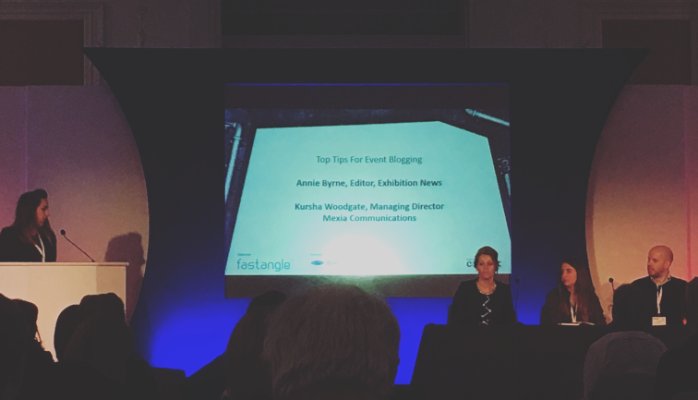Following on from Confex last week, one of the sessions I attended with interest was hosted by EN Editor, Annie Byrne, on the subject of events industry blogs.
The panel consisted of:
Kursha Woodgate, Managing Director, Mexia Communications | Jim Curry, Founder, Exhibitor Smarts | Juraj Holub, Marketing and Content Manager, Slido | Caitlin Kobrak, EN30/30 Member, Junior Marketing Strategist, GPJ and award winning events blogger
It was a short but insightful session for newcomers to the blogging world. I’ve offered some of the questions raised below incorporating the panels opinions, but as it’s my blog, there’s also a few of my own thrown in for good measure.
What style of writing do you use?
Often, if coming from a corporate perspective, the blogs tend to be more practical and a bit more “how to”. If it’s personal blog ie using LinkedIn, you’re allowed to be a bit more opinionated and practical. Everyone will have their own style.
When should you blog?
For the corporate world, it’s worth creating a content calendar so that you and your team aren’t doubling up on efforts and you’re not repeating yourself. Multiple divisions can also align their content better together. For example, a sure fire way to lose followers is to rehash something you’ve already written that year. Check your calendar and make sure you’re not repeating yourself.
However, it’s also important to be responsive. If you’ve just attended an event or there is a world news item that relates to your sector, see if there is a link and write about it. Being responsive and topical often gains more interactions.
What about your tone of voice?
Again it depends who you’re targeting. Everyone will have their own style but your tone of voice is likely to change if you’re talking to students or if you’re talking to statisticians. So the top tip from the panel here? Know your audience. Read what they read. Develop your style to fit one they’re likely to read. Or…create your own.
What content gets noticed?
Controversy definitely gets you noticed (just read some of Jim Curry’s blogs ;), but it all depends on who you’re targeting. And in support of Jim’s work, he’s actually producing some really thought provoking content that is often used by the wider industry!
You should try to find a balance between offering subjective content with a commercial focus or benefit if you’re writing for a corporate or promoting your business for example.
From the corporate perspective, writing really useful top tips or how to type posts will help spread the word or value that your products offer or are capable of. However, steer clear of rehashing content that you’ve already created (oops, have I already said that?). Remember also to not rewrite press releases. There is a difference between a press release and a blog! Have an opinion.
What defines a good blog?
Don’t think that the number of followers or likes a blog / blogger has, mean it’s a prestigious blog. The panel discussed that actually some of the blogs with fewer views had more interaction from readers in the form of comments or offline communications. So if you only get 20 views but you open up a line of communication with someone you’ve been trying to approach for years; that may be worth more than 1,000 views.
What about optimum length?
Queue some cheeky giggles… but on average it’s thought that a blog should be more than 400 words to provide enough information to get engaged, but not a rewrite of war and peace. 700 or so words is considered a good amount, with anything over needing some serious real and interesting content & insight (think facts / statistics / juice) to engage a reader for such a long time.
Why Blog?
This one sparked a few different approaches from the panel. Some blog for the fun of it but it appears the majority use it for crucial SEO where online ad spend is just too high to compete in a cost per click war.
My favourite comment on this closing part was:
Advertising tells people you’re a rock star. Content marketing shows them.
So, if you’re thinking of getting into blogging, give it a go. Give yourself a year. If it doesn’t work, don’t worry about it, move on.
A really fun, informal and informative session. Thanks Annie.
